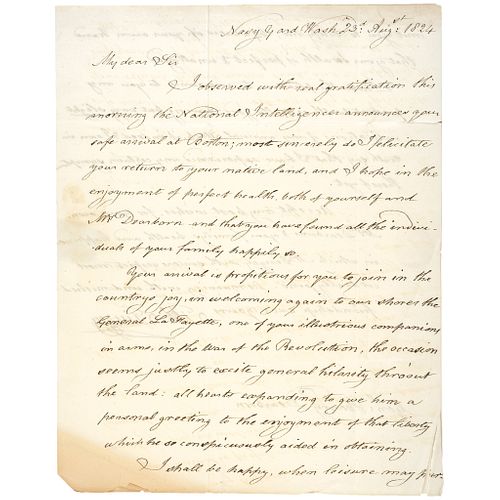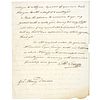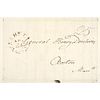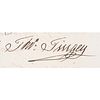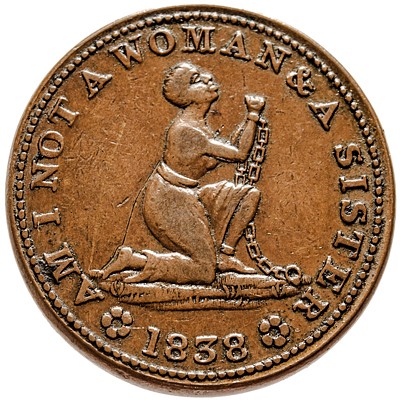1824 Letter: The Return of the Marquis de Lafayette to the United States
Lot 216
Categories
Estimate:
$1,200 - $1,400
Absentee vs Live bid
Two ways to bid:
- Leave a max absentee bid and the platform will bid on your behalf up to your maximum bid during the live auction.
- Bid live during the auction and your bids will be submitted real-time to the auctioneer.
Bid Increments
| Price | Bid Increment |
|---|---|
| $0 | $10 |
| $200 | $20 |
| $300 | $25 |
| $500 | $50 |
| $1,000 | $100 |
| $2,000 | $200 |
| $3,000 | $250 |
| $5,000 | $500 |
| $10,000 | $1,000 |
| $20,000 | $2,000 |
| $30,000 | $2,500 |
| $50,000 | $5,000 |
| $100,000 | $10,000 |
| $200,000 | $20,000 |
| $300,000 | $25,000 |
| $500,000 | $50,000 |
About Auction
By Early American History Auctions
Feb 27, 2021
Set Reminder
2021-02-27 12:00:00
2021-02-27 12:00:00
America/New_York
Bidsquare
Bidsquare : Black History & Slavery, Historic Autographs, Colonial America & Weapons
https://www.bidsquare.com/auctions/early-american-history-auctions/black-history-slavery-historic-autographs-colonial-america-weapons-6434
318 Lots of Rare, Historic Autographs, Americana, Civil War Era, George Washington, Abraham Lincoln, Slavery & Black History, Revolutionary War Era, Colonial America, Federal Period, War of 1812, Colonial Currency, Historic Early American Guns & more... Early American History Auctions auctions@earlyamerican.com
318 Lots of Rare, Historic Autographs, Americana, Civil War Era, George Washington, Abraham Lincoln, Slavery & Black History, Revolutionary War Era, Colonial America, Federal Period, War of 1812, Colonial Currency, Historic Early American Guns & more... Early American History Auctions auctions@earlyamerican.com
- Lot Description
Autographs
Thomas Tingley's Letter to General Henry Dearborn Heralding the Historic 1824 Return Tour of the Marquis de Lafayette
Commodore THOMAS TINGLEY (1750-1829). Commodore of the United States Navy. He served in the Continental Navy with distinction, and during the Quasi-War with France, and would serve as the Commandant of the Navy Yard until his death.
August 23, 1824-Dated, Historic Content Autograph Letter Signed, "Thos. Tingey," to General Henry Dearborn, Announcing the Return of the Marquis de Lafayette to the United States, Choice Very Fine. This Autograph Letter Signed, "Thos. Tingey," is written on watermarked paper, consists of 2-pages with Integral Address Leaf, written at Washington Navy Yard, measuring 9.75" x 7.75" addressed to General Henry Dearborn in Boston.
Henry Dearborn was President James Madison nominated choice for reappointment as Secretary of War, but the Senate rejected the nomination. He was later was Appointed Minister Plenipotentiary to Portugal by President James Monroe, and served from May 7, 1822, until June 30, 1824, when, by his own request, he was recalled. This Letter is sent just after Dearborn's return from Portugal.
Here, Tingey announces the return of the Marquis de Lafayette to the United States. Attached integral address leaf is also completed in Tingey's hand, and postmarked, "Washn. City." Seal tear to address leaf, and a couple of minor tears and light toning at bottom corner of letter. Lower right corner separated at fold. Superb content regarding the impending return and triumphant tour of Lafayette to the United States. This letter reads, in full:
"Navy and Wash 23d: Aug(u)st: 1824 ---- My Dear Sir, --- I observed with real gratification this morning the National Intelligence announces your safe arrival in Boston; most sincerely do I felicitate your return to your native land, and I hope in the enjoyment of perfect health, both of yourself and Mrs. Dearborn and that you have found all the individuals of your family happily so. -- Your arrival is propitious for you to join in the country's joy, in welcoming again to our shores the General La Fayette, one of your illustrious companions in arms, in the War of the Revolution, the occasion seems justly to excite general hilarity thro' out the land: all hearts expanding to give him a personal greeting to the enjoyment of that liberty which he so conspicuously aided in obtaining.
I shall be happy, when leisure may permit you to certify me, by a view of your own hand that your health is perfect & unalloyed. -- I have the pleasure to announce to you my present health is really good, having but very slight indications of my annual attack, if indeed I am in truth say that I have experienced any certain symptoms thereof yet. -- Accept my best wishes, for your own, Mrs. Dearborn & your family's health and happiness in which Mrs. Tingey -- with sincere respect - most cordially joins. - Remaining with undiminished friendship ever yours -- (Signed) Thos. Tingey".
The Marquis de Lafayette (1757-1834), served as an American Major General in the Revolutionary War. He returned to the United States from his native France in 1824, by special invitation of President James Monroe, then making an epochal tour of the country.
Thomas Tingey, in September 1798 was commissioned a Captain in the United States Navy and distinguished himself in the Quasi-War with France, as Commander of the man-of-war Ganges. During that time, Tingey commanded a squadron which cruised the waters of the Windward Passage between Hispaniola and Cuba to protect American shipping from French privateers. Tingey commanded Ganges as she took four prizes and is known for his bloodless encounter with the British frigate HMS Surprise.
In January 1800, Tingey was appointed to supervise construction of the new navy yard at Washington, D.C., and became its first Commandant on 23 November 1804. In the summer of 1814, as the British advanced on Washington, the Secretary of the Navy ordered Tingey to set fire to the yard. Tingey returned after the withdrawal of the British forces and commanded the yard until his death on 23 February 1829.
During the 1820s, Tingey was a member of the prestigious society, Columbian Institute for the Promotion of Arts and Sciences, who counted among their members former presidents Andrew Jackson and John Quincy Adams and many prominent men of the day, including well-known representatives of the military, government service, medical and other professions. Commodore Tingey was buried with military honors in what is now known as Congressional Cemetery in Washington, D.C..
Our Auction Contents:
Black History & Slavery: (Lots 1 - 63)
Abraham Lincoln Related: (Lots 64 - 74)
Historic Autographs: (Lots 75 - 235)
Colonial America: (Lots 236 - 261)
Revolutionary War: (Lots 262 - 304)
George Washington Related: (Lots 305 - 306)
Early American Guns & Weapons: (Lots 307 - 318) - Shipping Info
-
Early American provides in-house worldwide shipping. Please contact us directly if you have questions about your specific shipping requirements.
-
- Buyer's Premium



 EUR
EUR CAD
CAD AUD
AUD GBP
GBP MXN
MXN HKD
HKD CNY
CNY MYR
MYR SEK
SEK SGD
SGD CHF
CHF THB
THB